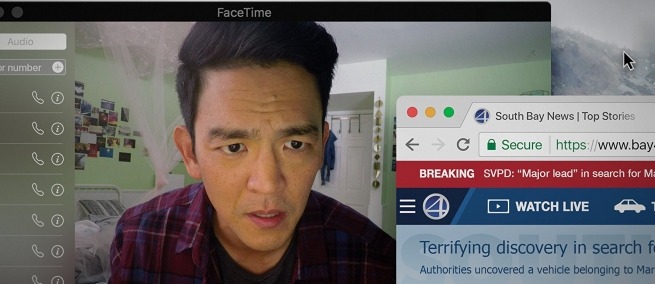Searching
Aneesh Chaganty (2018)
[av_image src=’http://jayruud.com/wp-content/uploads/2014/08/Tennyson-180×180.jpg’ attachment=’77’ attachment_size=’square’ align=’left’ animation=’left-to-right’ link=” target=” styling=” caption=’yes’ font_size=” appearance=’on-hover’]
Unless you are a teenager, the new cyber-thriller Searchingnow in wide-release (though you won’t find it in Conway) will be novel to you when you realize that the entire film is presented through the media of screen technology—mostly laptops but also cell phones, television screens, and surveillance cameras. If in fact you are a teenager, you may well have seen something like this before in the horror films Unfriended(2014) and Unfriended: Dark Web(2018), which have used a similar laptop-based shooting format. Those films, as well as Searchingitself, were produced by the Russian-Kazakh producer Timur Bekmambetov, who has said that he is planning a series of more than twenty computer-screen movies in the fashion of Unfriendedthat he claims will reflect “a new reality.” Personally, I was engaged by the novelty of a conventional film unfolding as if it were on a computer screen—a kind of reversal of the current trend in everyday life which allows us to watch a film originally made for the big screen on our own home computers. But I’m pretty sure the novelty will wear off long before I’ve seen twenty such productions. I’m thinking maybe more like two.
Which is not to say you shouldn’t go see this one. Searchingis truly a tour de force. Partly I’m fascinated by the process that first-time director Aneesh Chaganty went through to bring this to the screen. Chaganty’s story is a kind of contemporary Horatio Alger narrative, with an Indian-American hero. Chaganty was a recent graduate of the USC film school when his short film Seeds, a commercial he had shot using Google Glass software, reached more than a million views within 24 hours of its posting. Chaganty was ultimately offered a job in the Google Creative Lab when Google management became aware of Seeds’ phenomenal success. His initial idea for Searchingwas to make it a short film of about eight minutes or so, but the Hollywood film folks he pitched it to convinced him to rethink it as a full-length feature film. This led Chaganty to leave his well-paid dream job at Google in 2015 and spend two years with four other film-school grads and a couple of IMacs putting together a radical new kind of film. The first signs of success were the positive reviews and the Alfred P. Sloan Feature Film Prize that Searchingreceived at this year’s Sundance Film Festival. The movie has continued to pick up audience support and critical acclaim in the two weeks since its wide release.
While the way in which the story is told is fascinating and innovative, the story itself, as written by Chaganty and fellow USC film graduate Sev Ohanian, is not especially original, though it does contain some twists and turns that will surprise you. It begins with the introduction of a widowed single father, David Kim (John Cho of Star Trek), who is a fairly well off Silicon Valley engineer, and his sixteen-year-old daughter Margot (Michelle La in her first film). We get a montage of computer files showing the history of Michele and her mother, Pamela Nam Kim (Sara Sohn of Furious 7), who encouraged Michele in her piano study but who has some three years past succumbed to cancer.
The night on which the film’s plot kicks in Michele tells her father via face time that she has gone to a study session for an upcoming biology final and that she may be gone quite late. When the next morning David finds she apparently has not returned home at all, he begins to worry, and when he cannot contact her by phone or online, he realizes that he needs to report her to the police as a missing person. The investigating police officer, Rosemary Vick (Debra Messing of TV’s Will and Grace) is sympathetic—she has a teenaged son of her own—and tells David that he can help with the investigation if he can give the police the names of all Michelle’s friends and schoolmates. At that point David realizes he really does not know the names of any of Michelle’s friends or how to contact them, and he does the 21stcentury equivalent of looking into her private diary: he breaks into her laptop and begins to search all of her files, e-mails, and social media sites.
This is the point at which the double-meaning of the film’s title becomes apparent: not only are her father and the police both “searching” for Michelle, but the computer is doing its usual “searching” of the internet with each new search David performs. And as he delves deeper and deeper into Michelle’s private life, David finds what virtually any parent of a teenaged child is likely to find: that there are a whole lot of secrets there. “I didn’t know my daughter,” David laments at one point. It’s a lament that could be a large chorus joined by the parents in the audience. But when Detective Vick tells him, more than once, that these kinds of cases are never the parents’ fault, I think that we, along with David, tend to doubt her words. It’s hard to exonerate David completely in this affair.
Somewhere in the midst of his online searching, it becomes clear that Michelle has been depressed and isolated since her mother’s death, and that David has been unable or unwilling to talk about that loss with her. This is the point at which the film’s unusual narrative technique becomes a metaphor for David’s actual relationship with his daughter. She is always on the other end of a text message, a facetime video, an e-mail. When in one video, he is captured actually talking to Michelle in person, he is awkward, barely communicative. David has built a wall around himself through his gadgetry, and has little or no human contact with Michelle. If she has run away, is it really such a surprise?
Chaganty takes us around a number of twists and turns, and the ending does come as a bit of a surprise, though there are certainly clues enough throughout the film that make that end appropriate. Cho is believable as a concerned, at times panicked parent, going through all the highs and lows such an experience is likely to evoke. Messing is solid and believable as detective Vick. The actors have a particular and unusual challenge in this film, turning in essentially performances of the sort posted on Facebook or You tube. These two principals end up meeting the challenge admirably
On the negative side, the film does seem a little gimmicky at times, as if, having set for themselves certain ground rules, the filmmakers occasionally had to go to great lengths to ensure that those rules were not broken, no matter where the action was taking place. Sometimes we admire their cleverness in solving the problem, but at the same time might wish for a more traditional delivery of certain scenes. Another negative is Michelle: because she is almost never seen in real time, we know her only through bits and pieces of digital memory and what others say about her. Of course, in that we are in the same position as her father, who like us is trying to find out the truth of who she was. I’m not sure at the end whether we know her very well.
On the positive side, though, the film is taut and tense, the delivery clever, the main performances sound, and in a side note it’s the first major Hollywood thriller with an Asian in the lead role (more impressively, this is a fact no one in the film comments upon)—coming, interestingly enough, a week after the groundbreaking Asian rom-com Crazy Rich Asians. Furthermore, the movie raises a number of disturbing questions about teens and the internet. Do we know what they are involved in online? Are there dangers to them from stalkers with false identities? Do we leave so much of ourselves in digital footprints that nothing we do is private? Do we use the internet to keep from truly interacting with others on a personal level? All of these questions emerge, but not in any sort of preachy way in what is an intense and entertaining movie. Three Tennysons for this one.
COMING SOON!
Jay Ruud’s most recent novel, Lost in the Quagmire: The Quest of the Grail, will be available from the publisher on OCTOBER 15. You can preorder your copy direct from the publisher (Encircle Press) at http://encirclepub.com/product/lost-in-the-quagmire/You can also order an electronic version from Smashwords at https://www.smashwords.com/books/view/814922
When Sir Galahad arrives in Camelot to fulfill his destiny, the presence of Lancelot’s illegitimate son disturbs Queen Guinevere. But the young knight’s vision of the Holy Grail at Pentecost inspires the entire fellowship of the Round Table to rush off in quest of Christendom’s most holy relic. But as the quest gets under way, Sir Gawain and Sir Ywain are both seriously wounded, and Sir Safer and Sir Ironside are killed by a mysterious White Knight, who claims to impose rules upon the quest. And this is just the beginning. When knight after knight turns up dead or gravely wounded, sometimes at the hands of their fellow knights, Gildas and Merlin begin to suspect some sinister force behind the Grail madness, bent on nothing less than the destruction of Arthur and his table. They begin their own quest: to find the conspirator or conspirators behind the deaths of Arthur’s good knights. Is it the king’s enigmatic sister Morgan la Fay? Could it be Arthur’s own bastard Sir Mordred, hoping to seize the throne for himself? Or is it some darker, older grievance against the king that cries out for vengeance? Before Merlin and Gildas are through, they are destined to lose a number of close comrades, and Gildas finds himself finally forced to prove his worth as a potential knight, facing down an armed and mounted enemy with nothing less than the lives of Merlin and his master Sir Gareth at stake.
Pre-Order from Amazon here: https://www.amazon.com/Lost-Quagmire-Quest-Merlin-Mystery/dp/1948338122
Pre-Order from Barnes and Noble here: https://www.barnesandnoble.com/w/lost-in-the-quagmire-jay-ruud/1128692499?ean=9781948338127


